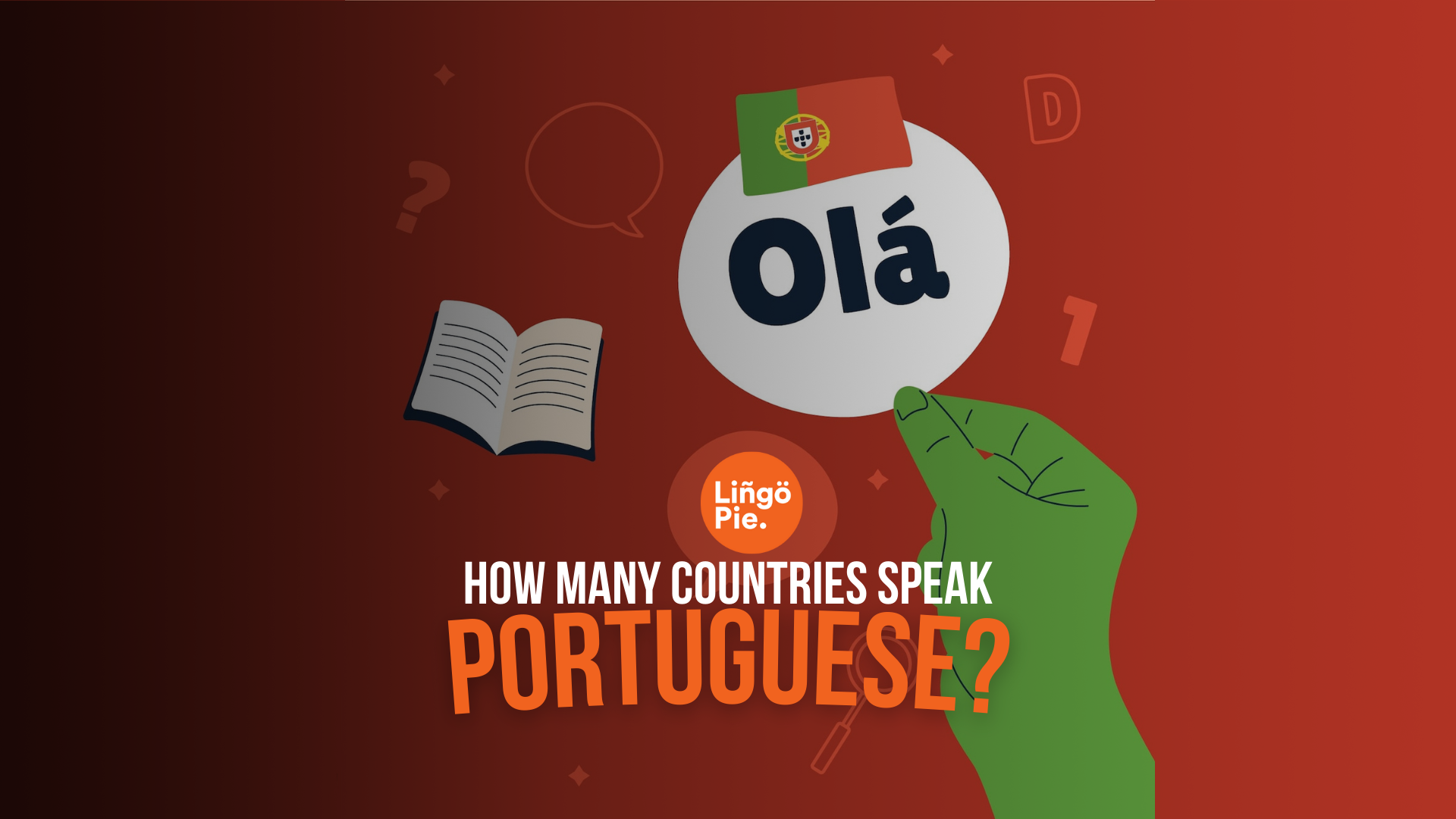Let's face it - there's nothing more awkward than freezing up when someone greets you in Portuguese. But don't worry! Whether you're dreaming of chatting with locals in Rio or planning to explore the streets of Lisbon, knowing how to say "hello" (and much more) in Portuguese is your first step to confident conversations.
In this guide, we'll walk you through 20 must-know Portuguese greetings for every situation. From casual "olás" to formal introductions and special occasion greetings, you'll learn exactly when and how to use each one. Plus, we'll cover the slight differences between Brazilian Portuguese and European Portuguese greetings when they occur.
- 19+ Portuguese Slang To Speak Like A Local
- How To Learn Portuguese Fast? [Best 2025 Guide]
- How To Form The Portuguese Future Tense [Easy Guide]

Basic Portuguese Greetings
In this section, we'll cover everything you need to get the conversation rolling: different ways to say hello and goodbye in Portuguese, greetings for specific times of the day, and some friendly expressions that'll help you sound more natural.
Ways To Say Hello In Portuguese
Just like in English, where we might switch between "hello," "hi," and "hey" depending on who we're talking to, Portuguese greetings can be formal, informal, or somewhere in between. Let's break down the most common ways to say hello and when to use each one.
| Greeting | Translation | Context |
|---|---|---|
| Alô? | Hello? | Used when answering the phone |
| Ché | Hi/Hey | Alternative spelling of Tché |
| Ei! | Hey! | Very informal, used among friends and young people |
| Oi | hi | Casual, everyday greeting used among friends and familiar people |
| Olá | hello | Universal, can be used in any situation - both formal and informal |
| Olá, rapaz | Hello, young man | Semi-formal greeting for young men |
| Olá, Senhora | Hello, Ma'am | Formal greeting for married/older women |
| Olá, senhorita | Hello, Miss | Formal greeting for young/unmarried women |
| Olá, Senhor | Hello, Sir | Formal greeting for men |
| Oie | Hiii | Super casual, playful version of "oi" (often used in texting) |
| Opa | Hey/Whoa | Informal Brazilian greeting, similar to "what's up" |
| Tché | Hi/Hey | Regional greeting from Southern Brazil (especially Rio Grande do Sul) |

Ways To Say Goodbye In Portuguese
Whether you're ending a business meeting or wrapping up a chat with friends, knowing these different ways to say goodbye will help you end conversations naturally.
| Phrase | Translation | Context |
|---|---|---|
| Abração | Big hug | Informal, friendly way to say goodbye (Brazilian) |
| Adeus | Goodbye | Formal, permanent goodbye (more common in Portugal) |
| Até a próxima | Until next time | Casual, friendly goodbye |
| Até amanhã | See you tomorrow | Casual, used when you'll meet the next day |
| Até breve | See you soon | Semi-formal, friendly |
| Até logo | See you later | Casual, common everyday goodbye |
| Até mais | See you later | Casual, very common in Brazil |
| Beijo | Kiss | Informal, between close friends (often used in texts) |
| Beijinho | Little kiss | Affectionate, informal goodbye |
| Falou | Later | Very informal, similar to "peace out" (Brazilian slang) |
| Fui | I'm out | Very informal, Brazilian slang |
| Tchau | Bye | Universal, casual goodbye (most common in Brazil) |
| Te vejo | See you | Casual, friendly |
| Valeu | Thanks/Bye | Informal Brazilian slang, means both thanks and goodbye |
| Vou indo | I'm going | Casual way to announce you're leaving |
| Xau | Bye | Alternative spelling of Tchau, casual |
Portuguese Greetings For The Time Of The Day
Time-specific greetings are super important in Portuguese - they're used way more frequently than in English and can really help you sound like a native speaker. These greetings change throughout the day, and using the right one shows you're in tune with Portuguese language customs.
Plus, there's a bonus: these greetings often double as a way to say both "hello" and "good morning/afternoon/evening" in one go!
| Greeting | Translation | When to Use |
|---|---|---|
| Bom dia | Good morning | Used from sunrise until noon |
| Boa tarde | Good afternoon | Used from noon until sunset |
| Boa noite | Good night/evening | Used after sunset and as a goodbye at night |
| Tenha um bom dia | Have a good day | When parting ways in the morning |
| Tenha uma boa tarde | Have a good afternoon | When parting ways in the afternoon |
| Tenha uma boa noite | Have a good night | When saying goodbye at night |
If you're ever unsure about whether to use "tarde" or "noite," just look outside - if the sun is still up, go with "boa tarde"; if it's dark, "boa noite" is your friend!

Friendly Portuguese Greetings
When you want to get a conversation going in Portuguese, these friendly conversation starters are your best friends! These phrases go beyond a simple "hello" and help you connect with people by showing interest in their well-being. They're perfect for breaking the ice and starting a real conversation - just remember that, like in English, sometimes people use these as simple greetings and aren't always expecting a detailed response about your day!
| Greeting | Translation | Context |
|---|---|---|
| Beleza? | All good? | Very casual Brazilian greeting, similar to "what's up?" |
| Como está? | How are you? | Formal way to ask how someone is doing |
| Como vai? | How's it going? | Semi-formal, works in most situations |
| E aí? | What's up? | Very informal, common among young people in Brazil |
| Qual é a boa? | What's good? | Very informal Brazilian slang |
| Tá bom? | All good? | Casual way to check in |
| Tudo bem? | Everything good? | Universal greeting that works in all situations |
| Tudo bom? | All good? | Slightly more casual version of "tudo bem?" |
| Tudo certo? | Everything alright? | Casual but polite way to ask how someone is |
| Tudo joia? | Everything great? | Casual Brazilian expression (literally "everything jewel?") |
When someone asks you "Tudo bem?" you can respond with "Tudo bem!" - it works as both a question and an answer. It's like saying "How are you?" "I'm good!" in English!

Advanced Portuguese Greetings For Special Occasions
Looking for a more advanced set of Portuguese greetings? In this section, we'll explore celebration-specific greetings for everything from birthdays to weddings, plus seasonal greetings that'll help you spread joy during holidays and special times of the year.
Celebration-Based Greetings In Portuguese
Want to be the perfect party guest or show someone you care about their special day? These celebration-based greetings will help you share the joy in Portuguese!
| Occasion | Greeting | Translation | Context |
|---|---|---|---|
| Birthday | Feliz aniversário! | Happy birthday! | Universal birthday greeting |
| Birthday | Parabéns! | Congratulations! | Used for birthdays and achievements |
| Birthday | Muitos anos de vida! | Many years of life! | Often added after "Parabéns" |
| Wedding | Felicidades aos noivos! | Happiness to the newlyweds! | Used at weddings |
| Wedding | Votos de felicidades! | Best wishes of happiness! | Formal wedding greeting |
| Achievement | Parabéns pela conquista! | Congratulations on your achievement! | Used for accomplishments |
| Achievement | Sucesso! | Success! | Used for new ventures |
| New Baby | Parabéns pelo bebê! | Congratulations on the baby! | For new parents |
| New Baby | Felicitações! | Congratulations! | Formal congratulations |
| Anniversary | Feliz aniversário de casamento! | Happy wedding anniversary! | For married couples |
| Graduation | Parabéns pela formatura! | Congratulations on graduating! | For graduates |
| New Home | Felicidades no novo lar! | Happiness in your new home! | For someone moving |
| Promotion | Parabéns pela promoção! | Congratulations on the promotion! | For career advancement |
In Brazilian Portuguese, "Parabéns" is often followed by "pra você" (to you), especially when singing the birthday song. And don't forget - these greetings are often accompanied by hugs and kisses on the cheek in Portuguese-speaking cultures!
Seasonal Greetings In Portuguese
No celebration guide would be complete without knowing how to spread holiday cheer in Portuguese! Whether you're celebrating Christmas, New Year's, or other seasonal occasions, these greetings will help you get into the festive spirit.
| Season/Holiday | Greeting | Translation | Context |
|---|---|---|---|
| Christmas | Feliz Natal! | Merry Christmas! | Universal Christmas greeting |
| Christmas | Boas Festas! | Happy Holidays! | General holiday season greeting |
| New Year | Feliz Ano Novo! | Happy New Year! | Used before and after New Year |
| New Year | Próspero Ano Novo! | Prosperous New Year! | More formal New Year greeting |
| Carnival | Bom Carnaval! | Happy Carnival! | Used during carnival season |
| Easter | Feliz Páscoa! | Happy Easter! | Easter greeting |
| Spring | Feliz Primavera! | Happy Spring! | Used at start of spring |
| Summer | Bom Verão! | Happy Summer! | Used at start of summer |
| Fall | Bom Outono! | Happy Fall! | Used at start of fall |
| Winter | Bom Inverno! | Happy Winter! | Used at start of winter |
In Brazil, New Year's Eve (Réveillon) is a huge celebration, especially on the beaches, where people traditionally wear white for good luck. If you're celebrating with Brazilians, you might hear "Feliz Réveillon!" as an additional New Year's greeting!

How To Learn Portuguese Greetings
Learning Portuguese greetings doesn't have to be overwhelming - it's all about practice and immersion. The key is to focus on learning greetings organically, in context, rather than trying to memorize them all at once. Start with the basics and gradually expand your greeting vocabulary as you become more comfortable with the language.
- Practice with native speakers whenever possible - even short exchanges can help build your confidence
- Use language exchange apps to practice greetings in real conversations
- Create sticky notes with different greetings and place them around your home
- Record yourself saying different greetings to perfect your pronunciation
- Pay attention to the time of day when practicing greetings to build natural habits
- Focus on one category of greetings at a time (like basic hellos or time-specific greetings)
- Try to notice the context in which different greetings are used by native speakers
Want to take your Portuguese greeting skills to the next level?
Try watching Portuguese TV shows and movies on Lingopie! This immersive approach lets you see how native speakers use these greetings in real-life situations. You'll pick up not just the words, but also the proper pronunciation, timing, and body language that goes with each greeting.
Plus, with Lingopie's interactive features, you can practice along with the shows and get instant feedback on your understanding.
Want to connect with Portuguese speakers like a pro?
And there we have our complete list of Portuguese greetings! As always, please don't feel pressured to use all these greetings right away. Start with the basics and gradually work your way up to more specific and formal greetings as your confidence grows. And most importantly, don't be afraid to practice!
Speaking of practice, why not try Lingopie free for 7 days and immerse yourself in authentic Portuguese content? With a free account, you can watch how native speakers use these greetings in real situations, perfect your pronunciation, and build your confidence through interactive learning.
Frequently Asked Questions About Portuguese Greetings
What's the difference between Brazilian Portuguese and European Portuguese greetings?
While many greetings are similar, there are some notable differences in usage and slang. Brazilian Portuguese tends to be more informal, using "oi" and "tchau" more frequently, while European Portuguese speakers often use "olá" and "adeus." Brazilians also use more regional expressions like "opa" and "beleza." Want to master both varieties? Check out Lingopie's diverse collection of Brazilian and Portuguese content to hear these differences in action through authentic shows and movies.
What's the most polite way to greet someone in Portuguese?
The most polite way to greet someone in Portuguese is to use time-specific greetings ("bom dia," "boa tarde," or "boa noite") followed by the appropriate honorific title (Senhor/Senhora). For example, "Bom dia, Senhora Silva" is a very respectful greeting. These formal greetings are especially important in professional settings or when meeting older people. You can observe these formal interactions in action through Lingopie's selection of Portuguese business and drama series.
How do I know when to use formal vs informal greetings in Portuguese?
Think of it like English - you wouldn't say "what's up" to your boss or "good evening, sir" to your best friend. Use formal greetings (with Senhor/Senhora) for business situations, with elderly people, or when meeting someone for the first time. Informal greetings like "oi" or "e aí" are perfect for friends, family, and casual situations. Practice recognizing these social contexts by watching real-life scenarios play out in Portuguese shows on Lingopie.
Do I need to kiss or hug when greeting people in Portuguese-speaking countries?
Physical greetings are common in Portuguese-speaking cultures, but they vary by region and context. In Brazil, a kiss on each cheek (or one kiss) is common between women or when greeting women, while men often greet with a handshake or quick hug. In Portugal, greetings tend to be slightly more reserved. Professional settings usually stick to handshakes. You can observe these cultural nuances in action through the variety of Portuguese content available on Lingopie.
What are common mistakes to avoid when using Portuguese greetings?
The biggest mistakes include using "boa noite" (good night) as a greeting during the day, forgetting to match the formality level to the situation, or using Brazilian slang in formal Portuguese settings. Another common error is using "adeus" (goodbye) casually in Brazil, where it's considered a very final farewell. To avoid these mistakes, it's helpful to see greetings used in context - try watching Portuguese content on Lingopie to see how natives naturally use these expressions.









![How To Learn Portuguese Fast? [Best 2025 Guide]](/blog/content/images/size/w300/2024/08/Lingopie-2.png)
